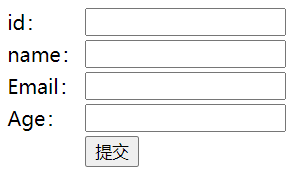使用Maven创建Spring-web项目的基本流程
简介:使用Spring、mybatis框架实现学生注册查询功能。
第一步:创建Maven项目
-
使用提供的maven-archetype-webapp模板。
- 创建好之后,将java文件夹标记为
Sources Root. - 创建资源文件夹
resources,将资源文件夹标记为Resources Root.
- 创建好之后,将java文件夹标记为
-
配置
pom.xml文件。主要的配置内容有:
- 修改<maven.compiler.source>1.7</maven.compiler.source>为
1.8 - 添加依赖:主要有:junit、spring-context、mybatis、spring-tx(在本项目中没用到事务)、spring-jdbc(与事务一块使用的)、mybatis-spring、mysql-connector-java、druid、jsp-api、servlet-api、spring-web。
- 添加build中的resources配置,目的是将Sources Root中的配置文件在编译的时候能够拷贝到classes对应的文件夹下。
<?xml version="1.0" encoding="UTF-8"?> <project xmlns="http://maven.apache.org/POM/4.0.0" xmlns:xsi="http://www.w3.org/2001/XMLSchema-instance" xsi:schemaLocation="http://maven.apache.org/POM/4.0.0 http://maven.apache.org/xsd/maven-4.0.0.xsd"> <modelVersion>4.0.0</modelVersion> <groupId>com.example</groupId> <artifactId>Spring10_web</artifactId> <version>1.0-SNAPSHOT</version> <packaging>war</packaging> <properties> <project.build.sourceEncoding>UTF-8</project.build.sourceEncoding> <maven.compiler.source>1.8</maven.compiler.source> <maven.compiler.target>1.8</maven.compiler.target> </properties> <dependencies> <!--junit--> <dependency> <groupId>junit</groupId> <artifactId>junit</artifactId> <version>4.11</version> <scope>test</scope> </dependency> <!--org.springframework--> <dependency> <groupId>org.springframework</groupId> <artifactId>spring-context</artifactId> <version>5.2.5.RELEASE</version> </dependency> <!--mybatis--> <dependency> <groupId>org.mybatis</groupId> <artifactId>mybatis</artifactId> <version>3.5.1</version> </dependency> <!-- spring事务 --> <dependency> <groupId>org.springframework</groupId> <artifactId>spring-tx</artifactId> <version>5.2.5.RELEASE</version> </dependency> <dependency> <groupId>org.springframework</groupId> <artifactId>spring-jdbc</artifactId> <version>5.2.5.RELEASE</version> </dependency> <!-- mybatis-spring集成的依赖 --> <dependency> <groupId>org.mybatis</groupId> <artifactId>mybatis-spring</artifactId> <version>1.3.2</version> </dependency> <!--mysql-connector-java--> <dependency> <groupId>mysql</groupId> <artifactId>mysql-connector-java</artifactId> <version>8.0.16</version> </dependency> <!--阿里的连接池--> <dependency> <groupId>com.alibaba</groupId> <artifactId>druid</artifactId> <version>1.1.10</version> </dependency> <!--jsp的依赖--> <dependency> <groupId>javax.servlet.jsp</groupId> <artifactId>jsp-api</artifactId> <version>2.1</version> <scope>provided</scope> </dependency> <!--servlet的依赖--> <dependency> <groupId>javax.servlet</groupId> <artifactId>servlet-api</artifactId> <version>2.5</version> <scope>provided</scope> </dependency> <!-- 为了使用监听器,需要引入spring-web的依赖--> <dependency> <groupId>org.springframework</groupId> <artifactId>spring-web</artifactId> <version>5.2.5.RELEASE</version> </dependency> </dependencies> <build> <!--将src/main/java下的mapper文件复制到classes文件中--> <resources> <resource> <directory>src/main/java</directory><!--所在的源代码目录--> <!--该文件夹下的以properties和xml为后缀文件都会被扫描到,在编译的时候会将其复制到classes文件夹下,而不会丢失配置文件。--> <includes> <include>**/*.properties</include> <include>**/*.xml</include> </includes> <filtering>false</filtering> </resource> </resources> </build> </project> - 修改<maven.compiler.source>1.7</maven.compiler.source>为
第二步:准备前端页面index.jsp
<html>
<head>
<title>学生注册页面</title>
</head>
<body>
<form action="${pageContext.request.contextPath}/register" method="post">
<table>
<tr>
<td>id:</td>
<td><input type="text" name="id"></td>
</tr>
<tr>
<td>name:</td>
<td><input type="text" name="name"></td>
</tr>
<tr>
<td>Email:</td>
<td><input type="text" name="email"></td>
</tr>
<tr>
<td>Age:</td>
<td><input type="text" name="age"></td>
</tr>
<tr>
<td></td>
<td><input type="submit" value="提交"></td>
</tr>
</table>
</form>
</body>
</html>
效果如下:
第三步:准备Student实体类
public class Student {
private Integer id;
private String name;
private String email;
private Integer age;
//对应的无参、有参的构造方法。
//对应的get、set和toString方法。
}
第四步:准备StudentService和StudentServiceImpl
StudentService.java
public interface StudentService {
//添加学生信息
Integer addStudent(Student student);
//查询所有学生信息
List<Student> getAllStudent();
}
StudentServiceImpl.java
public class StudentServiceImpl implements StudentService {
//引用类型
private StudentDao studentDao;
//用于setter方法注入
public void setStudentDao(StudentDao studentDao) {
this.studentDao = studentDao;
}
//添加学生信息
@Override
public Integer addStudent(Student student) {
Integer integer = studentDao.insertStudent(student);
return integer;
}
//查询所有学生信息
@Override
public List<Student> getAllStudent() {
List<Student> studentList = studentDao.getStudents();
return studentList;
}
第五步:准备StudentDao和StudentDao.xml
StudentDao.java
public interface StudentDao {
Integer insertStudent(Student student);
List<Student> getStudents();
}
StudentDao.xml
<?xml version="1.0" encoding="UTF-8" ?>
<!DOCTYPE mapper
PUBLIC "-//mybatis.org//DTD Mapper 3.0//EN"
"http://mybatis.org/dtd/mybatis-3-mapper.dtd">
<mapper namespace="com.example.dao.StudentDao">
<!--添加学生信息-->
<insert id="insertStudent">
insert into student values (#{id},#{name},#{email},#{age})
</insert>
<!--查询所有学生信息-->
<select id="getStudents" resultType="student">
select * from student order by id desc
</select>
</mapper>
第六步:书写mybatis主配置文件mybatis.xml
主要的配置内容有:
-
设置mybatis的打印日志,在调试的时候使用。
<setting name="logImpl" value="STDOUT_LOGGING"/> -
设置别名,目的是在mapper映射文件中,使用resultType可以使用别名。
格式是:接口名称首字母小写大写都可以。如:studentDao或者StudentDao
-
配置sql mapper(sql映射文件)的位置。
<package name="com.example.dao"/>加载这个包下的所有mapper文件.
mybatis.xml
<?xml version="1.0" encoding="UTF-8"?>
<!DOCTYPE configuration
PUBLIC "-//mybatis.org//DTD Config 3.0//EN"
"http://mybatis.org/dtd/mybatis-3-config.dtd">
<configuration>
<!--<settings>-->
<!--设置mybatis的打印日志-->
<!--<setting name="logImpl" value="STDOUT_LOGGING"/>-->
<!--</settings>-->
<!--设置别名-->
<typeAliases>
<!--name:实体类所在的包名-->
<package name="com.example.domain"/>
</typeAliases>
<!-- sql mapper(sql映射文件)的位置-->
<mappers>
<!--name:mapper文件所在包名,可以加载这个包下的所有mapper文件-->
<package name="com.example.dao"/>
</mappers>
</configuration>
第七步:书写RegisterServlet
RegisterServlet.java
public class RegisterServlet extends HttpServlet {
protected void doPost(HttpServletRequest request, HttpServletResponse response) throws ServletException, IOException {
//处理中文乱码
request.setCharacterEncoding("utf-8");
String id = request.getParameter("id");
String name = request.getParameter("name");
String email = request.getParameter("email");
String age = request.getParameter("age");
Student student = new Student(Integer.valueOf(id), name, email, Integer.valueOf(age));
//获取ApplicationContext对象
WebApplicationContext ac = WebApplicationContextUtils.getRequiredWebApplicationContext(getServletContext());
//获取StudentService对象
StudentService studentService = (StudentService) ac.getBean("studentService");
//执行添加学生信息的操作
Integer integer = studentService.addStudent(student);
if (integer > 0) {
response.sendRedirect(request.getContextPath()+"/result.jsp");
} else {
response.getWriter().print("注册失败");
}
}
protected void doGet(HttpServletRequest request, HttpServletResponse response) throws ServletException, IOException {
doPost(request, response);
}
}
第八步:书写spring配置文件applicationContext.xml
主要的配置内容有:
-
配置数据库配置文件的路径。
<context:property-placeholder location="classpath:db.properties"/>db.properties的内容如下:
jdbc.url=jdbc:mysql://localhost:3306/test?serverTimezone=UTC jdbc.username=root jdbc.password=root jdbc.maxActive=20 -
声明数据源,使用阿里的druid连接池。
<bean id="dataSource" class="com.alibaba.druid.pool.DruidDataSource" init-method="init" destroy-method="close"> -
声明mybatis中提供的SqlSessionFactoryBean类,该类可以创建SqlSessionFactory对象。
<bean id="sqlSessionFactory" class="org.mybatis.spring.SqlSessionFactoryBean"> <property name="dataSource" ref="dataSource"/> <property name="configLocation" value="classpath:mybatis.xml"/> </bean> -
声明MapperScannerConfigurer类,该类内部封装了生成每个dao接口的代理对象。
<bean class="org.mybatis.spring.mapper.MapperScannerConfigurer"> <property name="sqlSessionFactoryBeanName" value="sqlSessionFactory"/> <property name="basePackage" value="com.example.dao"/> </bean> -
声明StudentServiceImpl实现类.
<bean id="studentService" class="com.example.service.impl.StudentServiceImpl"> <property name="studentDao" ref="studentDao"/> </bean>
applicationContext.xml
<?xml version="1.0" encoding="UTF-8"?>
<beans xmlns="http://www.springframework.org/schema/beans"
xmlns:xsi="http://www.w3.org/2001/XMLSchema-instance"
xmlns:context="http://www.springframework.org/schema/context"
xsi:schemaLocation="http://www.springframework.org/schema/beans http://www.springframework.org/schema/beans/spring-beans.xsd http://www.springframework.org/schema/context https://www.springframework.org/schema/context/spring-context.xsd">
<!--数据库的配置文件-->
<context:property-placeholder location="classpath:db.properties"/>
<!--声明数据源,目的是连接数据库的-->
<bean id="dataSource" class="com.alibaba.druid.pool.DruidDataSource" init-method="init" destroy-method="close">
<property name="url" value="${jdbc.url}"/>
<property name="username" value="${jdbc.username}"/>
<property name="password" value="${jdbc.password}"/>
<property name="maxActive" value="${jdbc.maxActive}"/>
</bean>
<!--声明的是mybatis中提供的SqlSessionFactoryBean类,这个类可以创建SqlSessionFactory对象-->
<bean id="sqlSessionFactory" class="org.mybatis.spring.SqlSessionFactoryBean">
<property name="dataSource" ref="dataSource"/>
<property name="configLocation" value="classpath:mybatis.xml"/>
</bean>
<!--
创建dao对象,使用sqlSessionFactory.getMapper(Student.class)
Spring-mybatis整合了dao的获取方式,在MapperScannerConfigurer内部调用了getMapper方法,
生成每个dao接口的代理对象。
-->
<bean class="org.mybatis.spring.mapper.MapperScannerConfigurer">
<property name="sqlSessionFactoryBeanName" value="sqlSessionFactory"/>
<property name="basePackage" value="com.example.dao"/>
</bean>
<!--声明StudentServiceImpl实现类-->
<bean id="studentService" class="com.example.service.impl.StudentServiceImpl">
<property name="studentDao" ref="studentDao"/>
</bean>
</beans>
第九步:书写web.xml文件
主要的配置内容有:
-
注册ContextLoaderListener监听器,监听器的名称为:
org.springframework.web.context.ContextLoaderListener -
指定spring配置文件的位置。
<context-param> <param-name>contextConfigLocation</param-name> <param-value>classpath:applicationContext.xml</param-value> </context-param> -
注册Studentservlet。
<?xml version="1.0" encoding="UTF-8"?>
<web-app xmlns="http://xmlns.jcp.org/xml/ns/javaee"
xmlns:xsi="http://www.w3.org/2001/XMLSchema-instance"
xsi:schemaLocation="http://xmlns.jcp.org/xml/ns/javaee http://xmlns.jcp.org/xml/ns/javaee/web-app_4_0.xsd"
version="4.0">
<!--注册ContextLoaderListener监听器:
由于监听器需要创建ApplicationContext对象,默认会读取/WEB-INF/applicationContext.xml的配置文件,
由于applicationContext.xml在resources文件夹下,所以会报异常:
FileNotFoundException: Could not open ServletContext resource [/WEB-INF/applicationContext.xml]
解决方法:手动指定spring配置文件的位置。
配置监听器的目的:目的是为了创建容器对象,就能把applicationContext中的所有对象给创建好,用户拿来用就行了。
-->
<!--指定spring配置文件的位置-->
<context-param>
<param-name>contextConfigLocation</param-name>
<param-value>classpath:applicationContext.xml</param-value>
</context-param>
<listener>
<listener-class>org.springframework.web.context.ContextLoaderListener</listener-class>
</listener>
<servlet>
<servlet-name>RegisterServlet</servlet-name>
<servlet-class>com.example.controller.RegisterServlet</servlet-class>
</servlet>
<servlet-mapping>
<servlet-name>RegisterServlet</servlet-name>
<url-pattern>/register</url-pattern>
</servlet-mapping>
</web-app>

